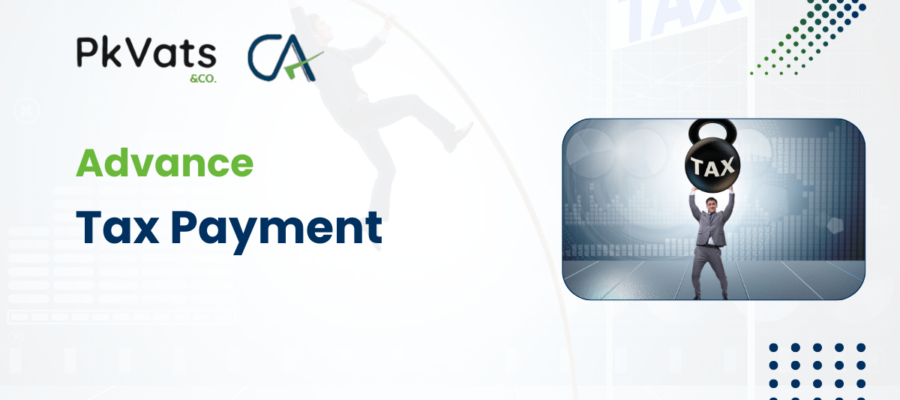Contents Covered
- What is advance tax payment
- Who should pay advance tax
- Due dates of advance tax payment
- How to calculate advance taxt liabilty
- Interest on delay in advance tax payment
- Conclusion
1. What is advance tax payment ?
In India, advance tax is a system of staggered payment of income tax by taxpayers during the financial year itself, rather than paying the entire tax liability at the end of the financial year. This system is also known as the “pay-as-you-earn” scheme. The provisions for advance tax are outlined in the Income Tax Act, 1961.
2. Who should pay advance tax ?
As per section 208 of the Income Tax Act 1961, if the estimated tax liability of any person is Rs 10,000 or more after computing TDS and deductions in a financial year, then it is liable to pay advance tax.
Person not liable to pay advance tax
If an Indian resident senior citizen (age 60 years or above) who is not generating income from any business or profession, then he/she is not liable to pay advance tax.
3. Due dates of advance tax payment
Advance tax is to be paid in different installments. The due dates for payment of different installments of advance tax are as follows:
| Status | By 15th June | By 15th Sept. | By 15th Dec. | By 15th March |
| Taxpayers | 15% of total tax | 45% of total tax | 75% of total tax | 100% of total tax |
- If an individual pay the tax till 31st march then it will also be consider as advance tax.
4. How to calculate advance tax liability ?
Illustration 1 :
Let us say Mr. X has
- Turnover from business is Rs 1,08,40,000.
- Expenses in the business is Rs 97,56,000
- Dividend on equity shares 10,000
- Interest on Fixed Deposit (FD) Rs 20,000
Computation of taxable income & tax liability for Mr. X :
| Particulars | Rs. |
Profits and gains of business or profession (1,08,40,000-97,56,000) Taxable business income | 10,84,000 |
Income from other source Equity share dividend Rs 10,000 Add: Interest on FD Rs 20,000 | 30,000 |
| Gross total income | 11,14,000 |
| Total Income (i.e. Taxable Income) | 11,14,000 |
| Tax on Rs. 11,14,000 | 77,100 |
| Add: Health and Education cess @ 4% | 3,084 |
| Tax liability | 80,184 |
In this case, the tax liability amounts to Rs. 80,184 which exceeds the limit Rs 10,000, so Mr. X is liability to pay advance tax.
The four installments for advance tax are given as:
| By 15th June | By 15th Sept. | By 15 Dec. | By 15th March |
| 11,794 | 35,381 | 58,968 | 80,184 |
Illustration 2 :
Let us say Mr. Y (Doctor) has
- Net Profit form profession Rs 89,00,000
- Dividend on equity shares Rs 1,00,000.
- Interest Income Rs 10,00,000
Computation of taxable income & tax liability for Mr. X :
| Particulars | Rs. |
Profits and gains of business or profession Taxable business income | 89,00,000 |
Income from other source Equity share dividend Rs 1,00,000 Add: Interest Income Rs 10,00,000 | 11,00,000 |
| Gross total income | 1,00,00,000 |
| Total Income (i.e. Taxable Income) | 1,00,00,000 |
| Tax on Rs. 1,00,00,000 | 27,00,000 |
| Add: Surcharge @ 10% | 2,70,000 |
| Add: Health and Education cess @ 4% | 1,18,800 |
| Tax liability | 30,88,800 |
In this case, the tax liability amounts to Rs. 30,88,800 which exceeds the limit Rs 10,000, so Mr. X is liability to pay advance tax.
The four installments for advance tax are given as:
| By 15th June | By 15th Sept. | By 15 Dec. | By 15th March |
| 4,58,172 | 13,74,516 | 22,90,860 | 30,88,800 |
5. Interest on delay in advance tax payment:
As per section 234B & 234C of the Income Tax Act 1961, there will be 1% per month interest will be charged on the unpaid amount.
For example :
Lets say, estimated tax liability for Mr. X is Rs 5,00,000 but he has not paid any advance tax till 31st march, then interest will be charged u/s 234B & 234C given as follows :
| Tax liability | 5,00,000 |
| Interest u/s 234B & 234C | 30,000* |
| Balance Tax liability on 1st April | 5,30,000 |
* Note : As from the above example we can see that if a person do not pay advance tax then it may leads to high interest charges. In the above case Rs 30,000 is the interest amount which is a approximate value because interest charges may vary depends on the taxpayer category, age of individual, nature of income & many other parameters.
6. Conclusion :
It’s crucial for taxpayers to stay informed about the specific rules and due dates for advance tax payments in India. Failing to comply with these provisions may result in interest charges. Consulting with a tax professional or referring to official tax guidelines can help ensure accurate and timely advance tax payments.
Any Question, feel free to connect with us




